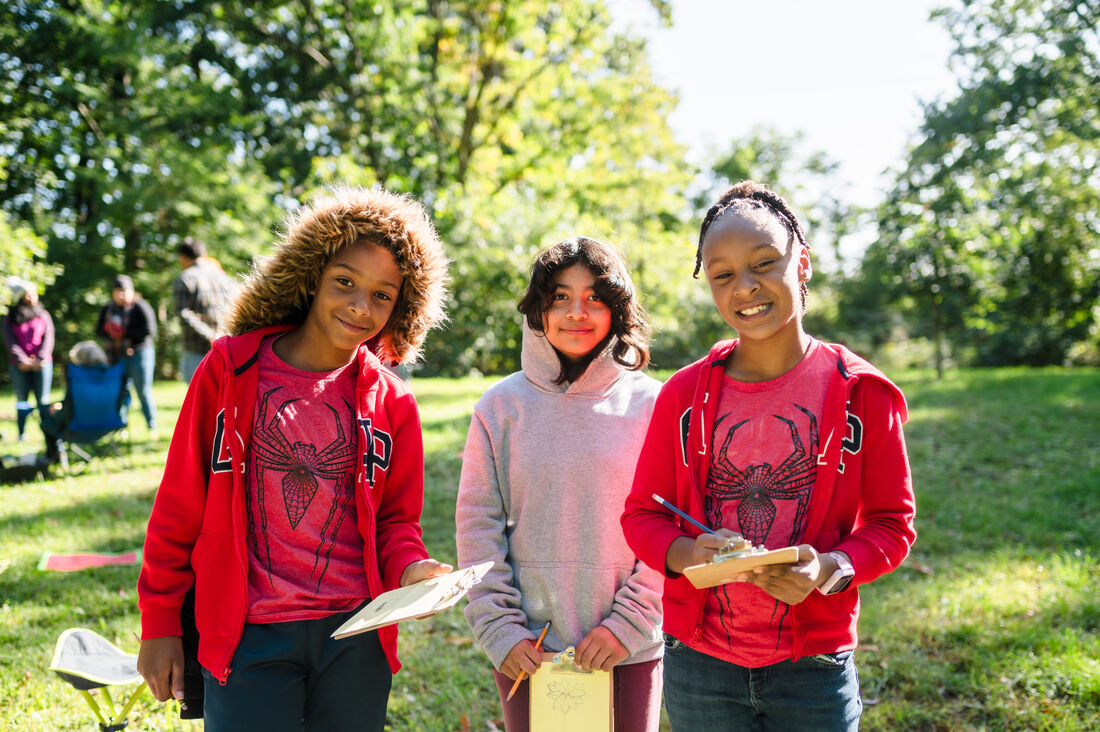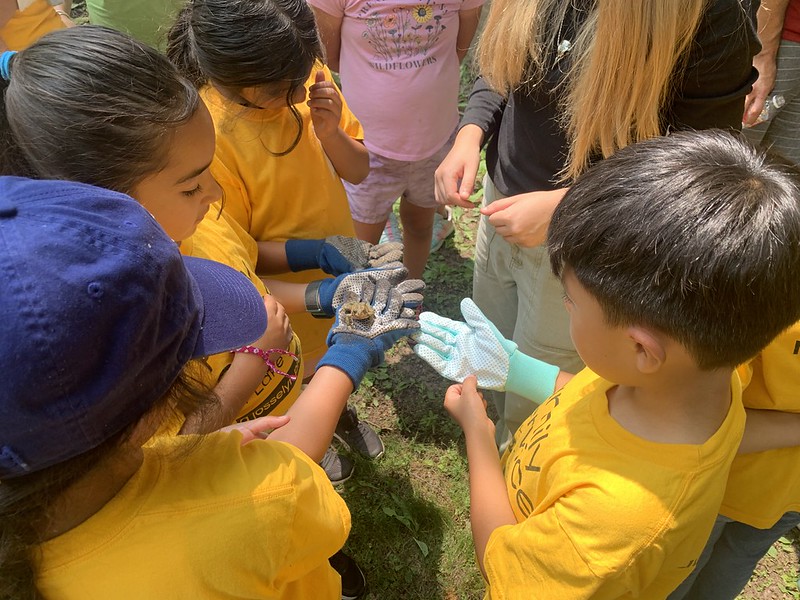Breaking Barriers
Access to Nature in Lake County
By Megan Donahue
Imagine taking a walk in the woods on a warm spring day. The sun is shining and the breeze lightly shakes the trees that are just sending out their first bright green leaves. As you walk, you hear a trill, and see a flash of red and yellow in the air: the red-winged blackbirds are back. You find a patch of little pink and white flowers–spring beauties, or claytonia virginica if you’re feeling fancy–and stop to admire them. At every turn of the path, there’s something to notice.
What you probably don’t notice is what’s happening in your body. Afterall, you’re experiencing the bounty of spring, not thinking about your cortisol levels. But a walk in the woods is more than recreational: research has demonstrated that time spent in nature has a significant impact on your health.

Access to Nature Improves Health Outcomes
A growing body of research points to connections between time spent outside in nature and improved health.1 Lower cortisol, reduced muscle tension, improved mood 2, and better sleep are just a few of the physical and psychological benefits associated with spending time outdoors. 3 One study even found that looking out the window at nature while you recover from surgery could improve your experience. 4 Time in greenspaces is particularly beneficial to children, improving everything from vision5 to attention6.
At Brushwood Center, we’re not surprised by this data–it supports what we see every day. In so many ways, nature is good for you. Unfortunately, these benefits are not equally accessible to everyone.
Think back to that imaginary walk in the woods. Would you feel as comfortable taking it if the stream was visibly polluted? If you had to walk across a four-lane highway to get there? If you were concerned about encountering violence? If there were no signs in your language pointing you to the trail? If you’d never been in the woods before? Any of these barriers could be enough to reduce your access to nature, and consequently, the health benefits associated with it.
Where you live should not determine how long you live, but your environment can make a difference in your health outcomes and whether or not it’s even safe to be outside. Black and Latine communities in Northeastern Lake County are disproportionately exposed to industrial pollution and face the lowest life expectancy and lowest income in Lake County. These communities are also overburdened by disproportionate asthma rates, diabetes rates, and mental health stressors.
Last year, Brushwood Center’s Health, Equity, and Nature Accelerator analyzed data around health and nature access in Lake County. The report of our findings, Health, Nature, and Equity: A Changing Climate in Lake County, IL, found that on top of concerns about air and water quality, the communities most impacted by environmental injustices also face barriers to accessing Lake County’s most beautiful natural assets, due to transportation, language, infrastructure, and policy limitations. As many as 1 in 2 Black residents in Lake County have concerns about access, safety, and maintenance of nearby parks and greenspaces, nearly twice that of White residents, as indicated in Lake County Public Health’s recent Community Health Assessment and echoed in the Accelerator’s report. These issues are amplified by our changing climate, with hotter, wetter, and more extreme weather patterns exacerbating many public health concerns.
Accelerating Health Equity
Everyone deserves a healthy environment and access to the outdoors.
The Health, Equity, and Nature Accelerator builds on Brushwood Center’s ongoing community engagement, advocacy, and research initiatives, with the goal of increasing collaborative solutions between health and environmental sectors. It amplifies this impact through cross-project alignment, prioritization of community-driven practices, and communication of key results for scalability and collaboration.
One of the key recommendations of the Health, Equity and Nature report is to integrate nature-based solutions with health care systems. This includes supporting health care providers with nature-based tools and professional development and integrating nature-based tools with behavioral health and trauma recovery programs.
Brushwood Center is putting these recommendations into action with TIERRA (Transforming Internal Experiences to Resilience and Restoration using Acceptance / Transformando el Interno y las Experiencias para la Resiliencia y la Restauración utilizando Aceptación), a nature-based mental health training for Community Health Workers developed in collaboration with the Highwood Public Library and Community Center, researcher Shreya Aragula of DePaul University, Rosalind Franklin University, and a team of community advisors.
A Community Health Worker (CHW) is a frontline public health worker who is a trusted member of and/or has an unusually close understanding of the community served.
The new program is co-created with Promotoras (CHWs) at the Highwood Public Library and Community Center, and is developing in stages. Currently, Aragula and Brushwood’s Coalition Building Manager, Jess Rodriguez, are collaborating to design the nature-based mental health training intervention.
The intervention is based in cognitive behavioral therapy and acceptance and commitment therapy (ACT), along with nature-based practices including forest therapy. “We’re exploring how we can implement the philosophies and the values of these practices to create a new mental health training manual,” explains Rodriguez.
Following the pilot program, TIERRA will expand to five community health care partners, who will implement the intervention and help further refine the manual. After that, the team will explore opportunities for further scalability to make these benefits more broadly accessible to Community Health Workers.
“Then the CHWs will train so that they can offer this intervention to the community. They will have understanding and tools that those practices use to have their own unique experience with mindfulness and with body-ness, to be able to share with their communities, to be able to share with themselves the idea of being rooted in nature, that this resource that we have at our fingertips can provide us with so many health benefits,” says Rodriguez.

Healthy People, Healthy Land
There isn’t one simple solution to create systemic change to address inequities at the intersection of health, climate, and nature. It will take ongoing collaboration between community and healthcare organizations, institutions and individuals, policy-makers and the people. Together, we can create a future of resilient and connected communities, both human and ecological, where all lead healthy and thriving lives.
Health, Equity, and Nature: A Changing Climate in Lake County, IL
The Accelerator’s newest report, Health, Equity, and Nature: A Changing Climate in Lake County, IL, is a tool for community members, organizations, and decision-makers to implement equitable, nature-based policy decisions to improve our communities’ health and wellbeing. This report includes key findings about access to nature, human health, and a healthy environment in Lake County, as well as actionable recommendations to empower change.
What is Forest Therapy?
Forest therapy is based on forest bathing, or shinrin-yoku, a Japanese practice whereby people immerse themselves into their natural environment. Forest bathers connect with the natural world around them as they take a guided, meditative walk, supporting improved immune function, cardiovascular and respiratory health, and reduced stress and depression. “It’s not a hike, it’s not a naturalist walk, but is more of a formalized practice of something that I would say is deeply intuitive for all humans,” says Jess Rodriguez, Brushwood Center’s Coalition Building Manager and certified Forest and Nature Therapy Guide.
Some of our favorite spots to forest bathe in Lake County? Ryerson Woods and Middlefork Savanna!
Brushwood North
Coming soon to Waukegan! Brushwood Center will launch an expanded strategy to support health and wellbeing in Northern Lake County, rooted in data and recommendations from the Health, Equity, and Nature report. Shared with Clean Power Lake County, this satellite location will help us engage more deeply with our partners and the communities most impacted by environmental injustices. Look for: expanded bilingual community outreach and programming, environmental justice and healing tours of the area, and more opportunities for youth to engage in the work of environmental justice.
1 https://e360.yale.edu/features/ecopsychology-how-immersion-in-nature-benefits-your-health
2 https://www.apa.org/monitor/2020/04/nurtured-nature
3 https://www.fs.usda.gov/features/wellness-benefits-great-outdoors
4 Ulrich RS. View through a window may influence recovery from surgery. Science. 1984 Apr 27;224(4647):420-1. doi: 10.1126/science.6143402. PMID: 6143402.
5 Xiong S, Sankaridurg P, Naduvilath T, Zang J, Zou H, Zhu J, Lv M, He X, Xu X. Time spent in outdoor activities in relation to myopia prevention and control: a meta-analysis and systematic review. Acta Ophthalmol. 2017 Sep;95(6):551-566. doi: 10.1111/aos.13403. Epub 2017 Mar 2. PMID: 28251836; PMCID: PMC5599950.
6 Faber Taylor, A., & Kuo, F. E. (2009). Children With Attention Deficits Concentrate Better After Walk in the Park. Journal of Attention Disorders, 12(5), 402-409. https://doi.org/10.1177/1087054708323000

